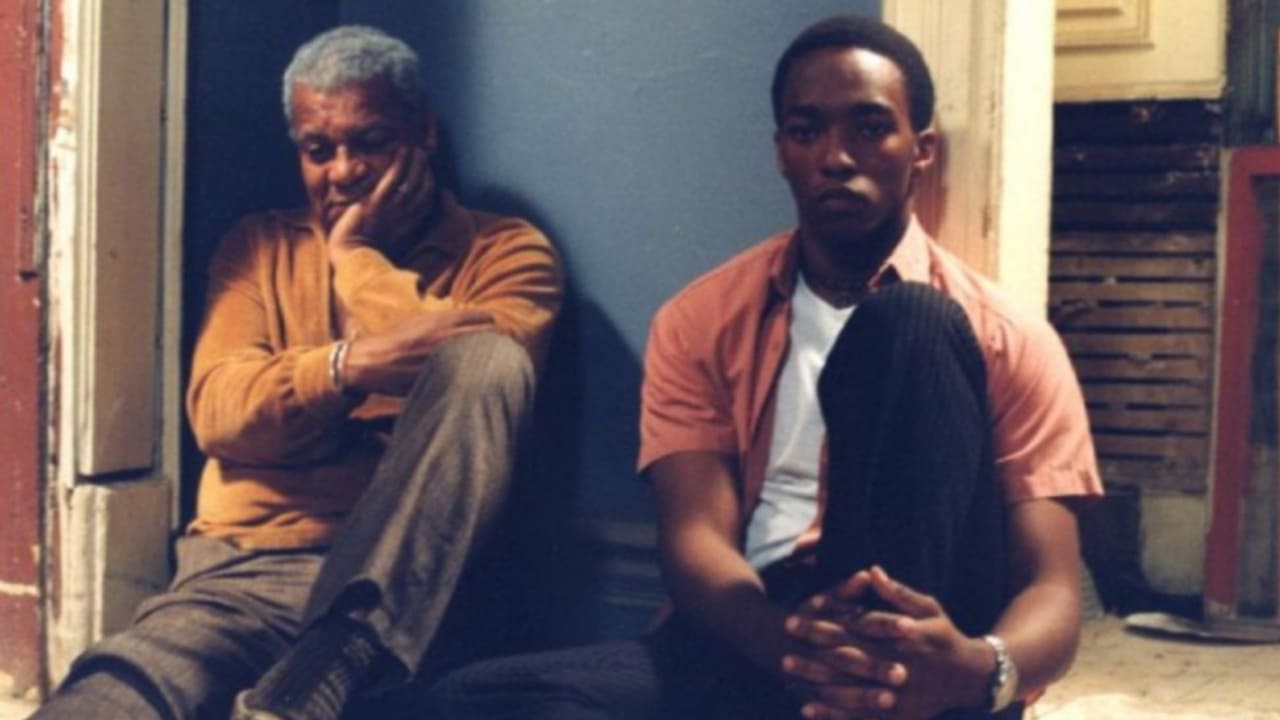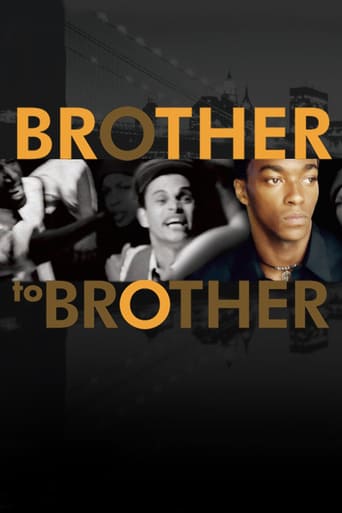sandover
Let's pick up what a Rotten (that is Tomato) critic says: "May just be the most sophisticated and compelling movie about the lives of black gay men ever made." That echoes uneasingly the down-playing article we listen to at a point in the film, condemning like a bunch the eminent group of Harlem Rennaissance artists, concluding like this: they will never be thoroughly cleansed; that is, from exposing themselves and readers - for they are mostly writers - to vices other than color: drugs and homosexuality; also, as an undercurrent, they will never be cleansed by their own blackness, of course.I said this echoes uneasingly the praise of the critic mentioned, and the crushing majority of the reviews. Why? The film, sanely evaluated, is like a school project; using a term paper as its framing device this unsurprisingly turns the film into a self-parody. Segregation, self-hatred, trying to find one's way, memory, self-reliance, what you will, it's all here, but it lacks a mature, assured grasp; for just plainly assured it might be, like all things trying to confuse the brave.Take, for example, albeit a crucial one, the fact that at the opening night Perry, our leading man and a young painter, is approached by a gallery owner who wants to represent him adding, "do the same themes, but in a more accessible way," thus echoing, with the exact words!, what the editor said to Zora Neale Hurston and Wallace Thurman. On top, on leaving the gallery, our leading man is submitted to thuggery by his own homophobic "brothers." A pamphlet, a libel, a manifesto and a melodrama are four different things; the film, bravely not holding back itself, mixes them all up: why use in such a blatant way the exact same words, does this make one's mark more powerful? No, it unwittingly mistakes being straightforward with being politically expedient (with just a pinch of blunt manipulation). Again, it echoes itself like a self-parody, for it does the same themes, but in a more accessible way.It wants to play a clean game but when you pile cliché on cliché disaster is what it paves for: the violence after the gallery echoes the timing of Bruce Nugent's death just after the completion of their dual portrait. We do not have any time to absorb any fact crucial for Perry's inner struggles and such a handling of timing and clichés, deprives the whole endeavor from any realistic involvement; add to that the fact our artist seems not to know the difference between arrogance and pride. And contrast it with a psychologically implausible dismissal of a white lover, because he does not think he can offer him the love he needs. After having slept some times together, and the white guy has just stepped into male-to-male love? Oh my, quite unsympathetic.So, to come back to the article and the reviews: just to overpraise a film because it is the first attempt, or attack in a virgin field does not mean the film will be redeemed; it will mostly mean that exactly the praise reads like an endeavor to downplay it in an even more haughty manner than the critic of the article in the film, that it is even more, unacknowledgedly, racist. Or, it will show the sad phenomenon of overplaying our repressed state, or liberally using it for pushing our political agenda in those wonderful years when so many things are liberally exploited, when fine distinctions are denied their status because the situation is urgent, and art becomes the veritable second rate citizen, if there ever was one. Or it just may be that losing one's virginity sounds more exciting than the sex itself; only later will one remember, or not, how the sex really was like.
bkoganbing
Unless I missed something in the screening I saw tonight, we had a college age kid get involved with a man who had to be at least 100 years old. The premise was a young sensitive black and gay student who's going through his own angst happens to meet up with a survivor from the Harlem Renaissance era of the 1920s. Anthony Mackie as the student and Roger Robinson as the artist/survivor both give fine performances and I was deeply moved. A lot of issues that they talked about are as relevant today as during the 1920s, although God knows a whole lot of history has occurred in the intervening years.After the film though I started thinking. Roger Robinson looks about 75 in the film, he was born in 1940 which would make him sixty five. But 105 would be a more appropriate age if we're to believe he was hanging out with Langston Hughes, Zora Hurston, etc. back in the day. I'm sure some other people had to realize that as well.In order to make the film more plausible, the writer and director should have placed the modern story circa 1980. That would have been more believable with the players ages.Still and all, it's a deeply moving film and one to be seen and treasured.PS. After writing this review I looked up Richard Bruce Nugent and found that he was born in 1906, died in 1987 and that he died in Hoboken, New Jersey.
graham clarke
There is a strong and understandable tendency to over praise films dealing with or representing minority groups simply as a means of encouragement. It's all very well being supportive of a particular minority group, but biased criticism ultimately does nobody any good.Countless of very mediocre gay themed movies have received disproportionate praise. With themes of being black as well as being gay, "Brother to Brother" is a perfect candidate for such slanted criticism.Let me state clearly, that to my mind, "Brother to Brother" is in no way mediocre clearly having being made with much care and devotion. As others have pointed out, it's informative and educational in its depiction and discussions of the Harlem Renaissance about which not terribly much is known by the wider public. Rodney Evans proves himself a director and writer with a lot of promise.However labelling this a "masterpiece" or "amazing" is to do a disservice to Evans. Hopefully he will go on to create masterpieces and amazing films but this is not it. "Brother to Brother" has much to recommend it. The performances are solid, the dialogue flows, the characters are interesting, and the cinematography is way above the average for a first time indie effort. For all this Rodney Evans certainly deserves praise.With all the genuine will to encourage young black, (or gay) film makers, it's important to keep focus on the real quality of the work. "Brother to Brother" despite it merits doesn't quite make the grade.
Prettygoldenboy
I loved this movie! From the moment it began as we traveled over the East River, I was totally absorbed it this movie. However, be aware that it is quite "erotic" even though it is not explicit. I saw the film in Manhattan early in the afternoon. There were quite a few "Thug" types in the audience, I guess because it is a predominatly "black" movie. To my surprise, they sat through the entire movie, erotic scenes and all. I think this makes a statement. Perhaps the "thug" scene is just a facade and this movie gets to the heart of what many men, including Black men feel. This movie has wonderful performances from everyone. It's ashamed that it is not in wider release. Congratulations to Anthony MacKie for taking on this role.

